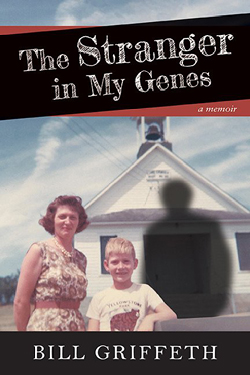Bill Griffeth’s painful journey
When DNA’s answer to the “who do you think you are” question is “not who you thought you were,” the reactions are varied.
Some people laugh.
Some people cry.
And journalists write a book.
 At least that’s what CNBC anchor Bill Griffeth did, after what he thought would be a routine confirmatory DNA test showed something that was far from routine: he was not the biological son of the man he knew as his father.
At least that’s what CNBC anchor Bill Griffeth did, after what he thought would be a routine confirmatory DNA test showed something that was far from routine: he was not the biological son of the man he knew as his father.
In The Stranger in My Genes: A Memoir,1 Griffeth tells the story of his own unexpected DNA results and the consequences to himself and his family of that discovery.
But it’s not the tale that the casual genetic genealogist may expect.
The fairy tale version, of course, is the discovery, the hunt for the biological family, the identification of the paternal family, and the happy reunion with that side of the family.
What Griffeth tells is the darker side: a searing tale of the emotional toll that can be associated with unexpected DNA results.
An avid genealogist who had traced what he thought was his paternal line back many generations, Griffeth took a YDNA test at the request of a cousin, fully expecting it to connect him to generations of Griffeths.
It didn’t work that way.
The test didn’t show him as a match to his Griffeth side, and he was stunned:
My body responded before my brain could. I experienced a strange sensation of floating, and I could no longer feel the chair I was sitting in or the Blackberry I was holding. My breathing became labored and shallow and I heard a roaring in my ears like ocean waves crashing off in the distance. Time stopped.2
To Griffeth, the discovery that the man who’d raised him wasn’t his biological father wasn’t something exciting and interesting. It was painful and devastating. He called it “a deeply unsettling truth”3 that called into question not just his understanding of his father — but of his mother as well.
It wasn’t an easy road: “I felt different,” he said. “A curtain had been pulled back, revealing a new truth about my past. A devastating truth: I had been deceived by the people I trusted the most, my parents.”4 And in the discovery, he felt like he had lost his father twice over.5
Griffeth goes on to describe his process of determining who his biological father was, and even general information about others in his paternal family. He describes his excrutiatingly painful conversations with his mother. How he came right to the brink of contacting his paternal family… and drew back out of concern for his mother: “I had been so obsessed with my paternity, … that I was neglecting the one parent I still had.”6
It’s a good read — and an important one for anyone even thinking about DNA testing. The simple reality is that any DNA test may reveal unexpected information, and no-one should take a DNA test without understanding that simple fact. The Genetic Genealogy Standards authored by a working committee of genealogists, genetic genealogists, scientists and others caution that:
…DNA test results, like traditional genealogical records, can reveal unexpected information about the tester and his or her immediate family, ancestors, and/or descendants. For example, both DNA test results and traditional genealogical records can reveal misattributed parentage, adoption, health information, previously unknown family members, and errors in well-researched family trees, among other unexpected outcomes.7
Griffeth’s book is a perfect example of unexpected information — and the emotional punch delivered by that unexpected information.
Highly recommended.
Bill Griffeth, The Stranger in My Genes: A Memoir (Boston: New England Historic Genealogical Society, 2016), 196pp, hard back, $29.95, e-book, $19.99.
SOURCES
- Bill Griffeth, The Stranger in My Genes: A Memoir (Boston: New England Historic Genealogical Society). Disclosure: The Legal Genealogist was provided a review copy of this book by the publisher, the New England Historic Genealogical Society. ↩
- Ibid., 5. ↩
- Ibid., 10. ↩
- Ibid., 90. ↩
- Ibid., 93. ↩
- Ibid., 163. ↩
- ¶12, Genetic Genealogy Standards (http://www.geneticgenealogystandards.com/ : accessed 5 Nov 2016). ↩



Thank you for your accurate review of Bill’s book. It is a good read of the hard-to-put-down variety.
It is an excellent read — are you the cousin Doug of the book?
Judy,
Thank you so much for bringing this book to my attention. I got the Kindle version and read thru it today – I really couldn’t put it down. Fascinating journey told by an excellent writer.